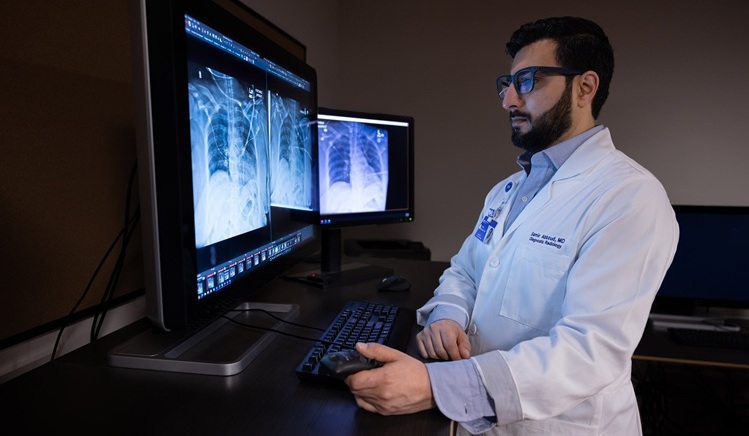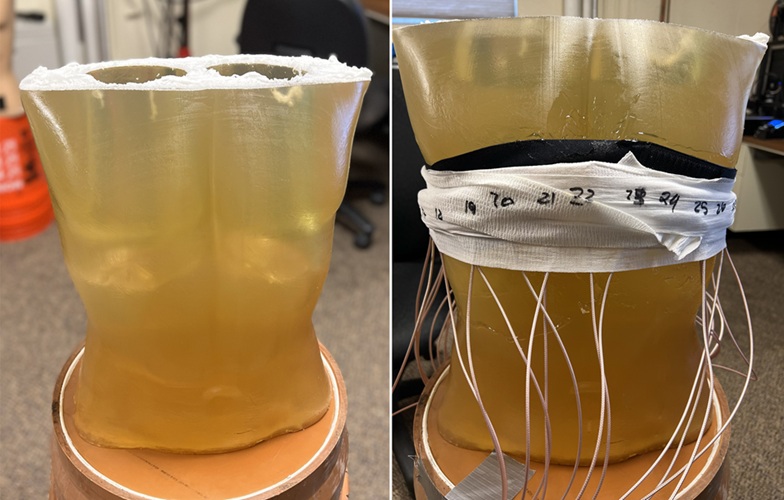Canadian Health Authorities Use Radiology Peer-Review Program to Enhance Care
|
By MedImaging International staff writers Posted on 26 Dec 2012 |
A radiologist peer-review system allows organizations to track the complete imaging review process, and integrates with multiple picture archiving communication systems (PACS) to support cross-facility peer review.
The British Columbia Ministry of Health (Vancouver, Canada) has chosen McKesson (San Francisco, CA, USA) as the vendor for its radiologist peer-review initiative, the single largest cross-facility initiative of its kind in North America. As part of its ongoing quality improvement program, the Ministry of Health will utilize McKesson QICS for Radiologist Peer Review in a pilot to help update medical imaging processes and improve quality of care.
The Vancouver Island Health Authority will be first to employ McKesson’s system as part of the initial phase of the program, which includes more than 200 radiologists. In later phases, this provincial project will cover an area that is 1.4 times larger than the state of Texas and involves radiologists reviewing more than 3.5 million exams conducted annually.
The pilot will demonstrate the ability for a case that is initially read by a radiologist, at one health authority, to be peer-reviewed anonymously by a radiologist located in a different location and on a separate PACS. “Conducting peer review of radiologist reports is challenging, particularly across distinct infrastructures, hospital systems and PACS we have throughout our province,” said Dr. John Mathieson, medical director, medical imaging, Vancouver Island Health Authority. “By choosing McKesson for this initiative, for the first time we’ll have the ability to run a comprehensive province-wide quality improvement process, and be able to make some valuable changes that will result in better reporting of imaging studies.”
McKesson QICS for Radiologist Peer Review provides real-time reviews in a fully automated regulatory compliant system, incorporating to existing technology and enhancing existing workflow. The system’s novel rules engine intelligently selects the exams to be reviewed and routes them to the appropriate radiologist based on subspecialty. In the past, a peer review would occur days or weeks after a radiologist writes a report. With this system, the review can occur before the radiology report is sent to the ordering physician, so any needed intervention or corrections can be made in a timely way.
“McKesson QICS for Radiologist Peer Review is uniquely designed to help improve the exchange of information across large, complex hospital networks,” said Kevan Torgerson, president, enterprise medical imaging, McKesson Provider Technologies. “We look forward to working with the British Columbia Ministry of Health on this groundbreaking pilot. Our goal is to help organizations maximize the value of this solution to drive excellence in the delivery of better care, better business, and better connectivity.”
The British Columbia Ministry of Health has overall responsibility for ensuring that quality, appropriate, cost effective and timely health services are available for all British Columbians. The Ministry provides leadership, direction, and support to health-service delivery partners and sets province-wide goals, standards, and expectations for the delivery of health services. The Province’s six health authorities are the organizations primarily responsible for health service delivery. Five regional health authorities deliver a full range of health services to meet the needs of the population within their respective geographic regions.
A sixth health authority, the Provincial Health Services Authority, is responsible for managing province-wide health programs. The Ministry tracks the delivery of health services and the health of British Columbia’s population on an ongoing basis.
Related Links:
British Columbia Ministry of Health
McKesson
The British Columbia Ministry of Health (Vancouver, Canada) has chosen McKesson (San Francisco, CA, USA) as the vendor for its radiologist peer-review initiative, the single largest cross-facility initiative of its kind in North America. As part of its ongoing quality improvement program, the Ministry of Health will utilize McKesson QICS for Radiologist Peer Review in a pilot to help update medical imaging processes and improve quality of care.
The Vancouver Island Health Authority will be first to employ McKesson’s system as part of the initial phase of the program, which includes more than 200 radiologists. In later phases, this provincial project will cover an area that is 1.4 times larger than the state of Texas and involves radiologists reviewing more than 3.5 million exams conducted annually.
The pilot will demonstrate the ability for a case that is initially read by a radiologist, at one health authority, to be peer-reviewed anonymously by a radiologist located in a different location and on a separate PACS. “Conducting peer review of radiologist reports is challenging, particularly across distinct infrastructures, hospital systems and PACS we have throughout our province,” said Dr. John Mathieson, medical director, medical imaging, Vancouver Island Health Authority. “By choosing McKesson for this initiative, for the first time we’ll have the ability to run a comprehensive province-wide quality improvement process, and be able to make some valuable changes that will result in better reporting of imaging studies.”
McKesson QICS for Radiologist Peer Review provides real-time reviews in a fully automated regulatory compliant system, incorporating to existing technology and enhancing existing workflow. The system’s novel rules engine intelligently selects the exams to be reviewed and routes them to the appropriate radiologist based on subspecialty. In the past, a peer review would occur days or weeks after a radiologist writes a report. With this system, the review can occur before the radiology report is sent to the ordering physician, so any needed intervention or corrections can be made in a timely way.
“McKesson QICS for Radiologist Peer Review is uniquely designed to help improve the exchange of information across large, complex hospital networks,” said Kevan Torgerson, president, enterprise medical imaging, McKesson Provider Technologies. “We look forward to working with the British Columbia Ministry of Health on this groundbreaking pilot. Our goal is to help organizations maximize the value of this solution to drive excellence in the delivery of better care, better business, and better connectivity.”
The British Columbia Ministry of Health has overall responsibility for ensuring that quality, appropriate, cost effective and timely health services are available for all British Columbians. The Ministry provides leadership, direction, and support to health-service delivery partners and sets province-wide goals, standards, and expectations for the delivery of health services. The Province’s six health authorities are the organizations primarily responsible for health service delivery. Five regional health authorities deliver a full range of health services to meet the needs of the population within their respective geographic regions.
A sixth health authority, the Provincial Health Services Authority, is responsible for managing province-wide health programs. The Ministry tracks the delivery of health services and the health of British Columbia’s population on an ongoing basis.
Related Links:
British Columbia Ministry of Health
McKesson
Latest Imaging IT News
- New Google Cloud Medical Imaging Suite Makes Imaging Healthcare Data More Accessible
- Global AI in Medical Diagnostics Market to Be Driven by Demand for Image Recognition in Radiology
- AI-Based Mammography Triage Software Helps Dramatically Improve Interpretation Process
- Artificial Intelligence (AI) Program Accurately Predicts Lung Cancer Risk from CT Images
- Image Management Platform Streamlines Treatment Plans
- AI-Based Technology for Ultrasound Image Analysis Receives FDA Approval
- AI Technology for Detecting Breast Cancer Receives CE Mark Approval
- Digital Pathology Software Improves Workflow Efficiency
- Patient-Centric Portal Facilitates Direct Imaging Access
- New Workstation Supports Customer-Driven Imaging Workflow
Channels
Radiography
view channel
AI Radiology Tool Identifies Life-Threatening Conditions in Milliseconds
Radiology is emerging as one of healthcare’s most pressing bottlenecks. By 2033, the U.S. could face a shortage of up to 42,000 radiologists, even as imaging volumes grow by 5% annually.... Read more
Machine Learning Algorithm Identifies Cardiovascular Risk from Routine Bone Density Scans
A new study published in the Journal of Bone and Mineral Research reveals that an automated machine learning program can predict the risk of cardiovascular events and falls or fractures by analyzing bone... Read more
AI Improves Early Detection of Interval Breast Cancers
Interval breast cancers, which occur between routine screenings, are easier to treat when detected earlier. Early detection can reduce the need for aggressive treatments and improve the chances of better outcomes.... Read more
World's Largest Class Single Crystal Diamond Radiation Detector Opens New Possibilities for Diagnostic Imaging
Diamonds possess ideal physical properties for radiation detection, such as exceptional thermal and chemical stability along with a quick response time. Made of carbon with an atomic number of six, diamonds... Read moreMRI
view channel
New MRI Technique Reveals Hidden Heart Issues
Traditional exercise stress tests conducted within an MRI machine require patients to lie flat, a position that artificially improves heart function by increasing stroke volume due to gravity-driven blood... Read more
Shorter MRI Exam Effectively Detects Cancer in Dense Breasts
Women with extremely dense breasts face a higher risk of missed breast cancer diagnoses, as dense glandular and fibrous tissue can obscure tumors on mammograms. While breast MRI is recommended for supplemental... Read moreUltrasound
view channel
New Medical Ultrasound Imaging Technique Enables ICU Bedside Monitoring
Ultrasound computed tomography (USCT) presents a safer alternative to imaging techniques like X-ray computed tomography (commonly known as CT or “CAT” scans) because it does not produce ionizing radiation.... Read more
New Incision-Free Technique Halts Growth of Debilitating Brain Lesions
Cerebral cavernous malformations (CCMs), also known as cavernomas, are abnormal clusters of blood vessels that can grow in the brain, spinal cord, or other parts of the body. While most cases remain asymptomatic,... Read moreNuclear Medicine
view channel
New Imaging Approach Could Reduce Need for Biopsies to Monitor Prostate Cancer
Prostate cancer is the second leading cause of cancer-related death among men in the United States. However, the majority of older men diagnosed with prostate cancer have slow-growing, low-risk forms of... Read more
Novel Radiolabeled Antibody Improves Diagnosis and Treatment of Solid Tumors
Interleukin-13 receptor α-2 (IL13Rα2) is a cell surface receptor commonly found in solid tumors such as glioblastoma, melanoma, and breast cancer. It is minimally expressed in normal tissues, making it... Read moreGeneral/Advanced Imaging
view channel
CT Colonography Beats Stool DNA Testing for Colon Cancer Screening
As colorectal cancer remains the second leading cause of cancer-related deaths worldwide, early detection through screening is vital to reduce advanced-stage treatments and associated costs.... Read more
First-Of-Its-Kind Wearable Device Offers Revolutionary Alternative to CT Scans
Currently, patients with conditions such as heart failure, pneumonia, or respiratory distress often require multiple imaging procedures that are intermittent, disruptive, and involve high levels of radiation.... Read more
AI-Based CT Scan Analysis Predicts Early-Stage Kidney Damage Due to Cancer Treatments
Radioligand therapy, a form of targeted nuclear medicine, has recently gained attention for its potential in treating specific types of tumors. However, one of the potential side effects of this therapy... Read moreIndustry News
view channel
GE HealthCare and NVIDIA Collaboration to Reimagine Diagnostic Imaging
GE HealthCare (Chicago, IL, USA) has entered into a collaboration with NVIDIA (Santa Clara, CA, USA), expanding the existing relationship between the two companies to focus on pioneering innovation in... Read more
Patient-Specific 3D-Printed Phantoms Transform CT Imaging
New research has highlighted how anatomically precise, patient-specific 3D-printed phantoms are proving to be scalable, cost-effective, and efficient tools in the development of new CT scan algorithms... Read more
Siemens and Sectra Collaborate on Enhancing Radiology Workflows
Siemens Healthineers (Forchheim, Germany) and Sectra (Linköping, Sweden) have entered into a collaboration aimed at enhancing radiologists' diagnostic capabilities and, in turn, improving patient care... Read more














.jpeg)



